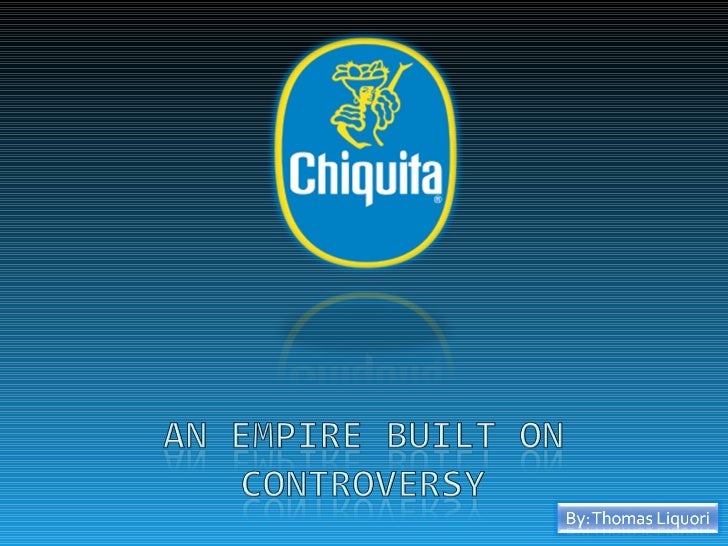Blood Bananas Chiquita In Colombia Case Study Pdf
- Chiquita Case Study
- Chiquita Blood Bananas And Ethics
- Blood Bananas Chiquita In Colombia Case Study Pdf
Secondly, Hills noted that Chiquita's management was certain that most, if not all, banana producers with operations in Colombia were also making extortion payments to. AUC.5 He asked whether the DOJ wished to notify these other companies of the issue and to explain to the Colombian government that. Dole Hawaii 1851 Largest Producer of fresh fruits and vegetables 1968 bought Standard Fruit and Steam Shop Company Bananas Del Monte San Francisco, California Food and pet products S&W, Meow Mix, Kibbles 'n Bits Chiquita 1899 United Fruit Company 1970 United Brands Company 1990.
Download file to see previous pages However, this did not go well with the victim’s families, and in 2010 they compiled a court suit demanding for payment from the company. At the same time, there was a parallel investigation by Bogota investigators to investigate other U.S multinationals that were involved in similar practices, collaborating with terrorist while conducting business. THE REACTION OF THE COMPANY’S MANAGEMNET The Company’s management found itself in a very tricky situation after the revelation of the company’s collaboration with the terrorists in doing business. This left the management to choose between moral responsibility in profit management or just the act of business and making profit without considering any moral obligation. In an environment such as that of Colombia, it was difficult doing business because of the strength rebels and insurgents in the country. The insurgents had every shot when it comes to business decision making. Since the 80s, the business of bananas in this country had been characterized with gunfire. In the 1960s, the National Liberation Army (ELN) and Revolutionary Armed Forces of Columbia (FARC) were founded and subsequently lead to the beginning of the guerilla insurgency against the existing Colombian administrations. The consequent targeting of public infrastructure and civilians by different armed groups resulted to creation of private paramilitary groups and guerrillas to fight against them. After the fall of the Soviet Union, the emergence of powerful drug cartels, the spread of the illegal drug trade and the United States backed War on Drugs increased the conflict to a greater level (Schotter and Teagarden, p10). Revolutionary Armed Forces of Columbia claims to represent the..The Company’s management found itself in a very tricky situation after the revelation of the company’s collaboration with the terrorists in doing business. This left the management to choose between moral responsibility in profit management or just the act of business and making profit without considering any moral obligation. In an environment such as that of Colombia, it was difficult doing business because of the strength rebels and insurgents in the country. The insurgents had every shot when it comes to business decision making. Since the 80s, the business of bananas in this country had been characterized with gunfire. In the 1960s, the National Liberation Army (ELN) and Revolutionary Armed Forces of Columbia (FARC) were founded and subsequently lead to the beginning of the guerilla insurgency against the existing Colombian administrations. The consequent targeting of public infrastructure and civilians by different armed groups resulted to creation of private paramilitary groups and guerrillas to fight against them. After the fall of the Soviet Union, the emergence of powerful drug cartels, the spread of the illegal drug trade and the United States backed War on Drugs increased the conflict to a greater level (Schotter and Teagarden, p10).
Chiquita Case Study
 Revolutionary Armed Forces of Columbia claims to represent the rural poor in a struggle against Colombia’s wealthier classes and subsequently opposing the U.S influence in Colombia, monopolization of natural resources by multinational corporations, neo-imperialism and government violence. ..Download file to see next pagesRead More
Revolutionary Armed Forces of Columbia claims to represent the rural poor in a struggle against Colombia’s wealthier classes and subsequently opposing the U.S influence in Colombia, monopolization of natural resources by multinational corporations, neo-imperialism and government violence. ..Download file to see next pagesRead More
Access to case studies expires six months after purchase date.
Publication Date: November 11, 2010
Chiquita Brands International and its leaders learned a very hard lesson about paying off terrorist groups to protect their employees. Torrent lea passion mode pc game online. Over the past 25 years, no place has been more perilous for companies than Colombia, a country that is finally beginning to emerge from the effects of civil war and narco-terrorism. In 2004, Chiquita voluntarily revealed to the U.S. Justice Department that one of its Colombian banana subsidiaries had made protection payments to terrorist groups from 1997 through 2004. The Justice Department began an investigation, focusing on the role and conduct of Chiquita and some of its officers in this criminal activity. Subsequently, Chiquita entered into a plea agreement that gave them the dubious distinction of being the first major U.S. company ever convicted of dealing with terrorists, and resulted in a fine of US$25 million and other penalties. To make matters worse, the industry was facing pressure from increasing retailer purchasing power, major changes in consumer tastes and preferences, and Europe's imposition of an 'onerous tariff' on companies that sourced bananas from Latin America. With this in mind, Fernando Aguirre, Chiquita's CEO since 2004, reflected on how the company had arrived at this point, and what had been done to correct the course so far. He faced major challenges to the company's competitive position in this dynamic industry. What would it take to position the company on a more positive competitive trajectory? Would this even be possible in this industry and in the business climate Chiquita faced?
Chiquita Blood Bananas And Ethics
Product #: TB0245-PDF-ENG
TB0245-PDF-ENGBlood Bananas Chiquita In Colombia Case Study Pdf
Pages: 16